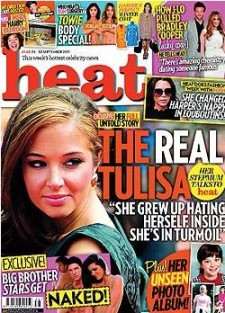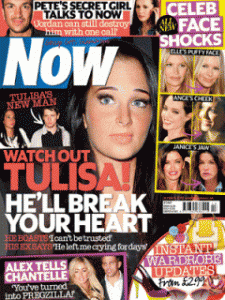Hail Tulisa, The Female Boss
Hail Tulisa, The Female Boss
by Emma Garman

A series dedicated to explaining Britain’s manufactured celebrities to an American audience.
When a society is as riven with conflict as today’s Britain, it takes a special kind of momentous event, the recognition of a greater enemy, to unite Tories and socialists, celebs and civilians, those who yearn for Kate Winslet’s excommunication from the planet and those who’d be content with her bleak and everlasting obscurity. So it was that last week, the nation put aside its differences and came together in support of one grievously wronged young woman: 23-year-old Tulisa, formerly of hip-hop trio N-Dubz and now a solo artist and beloved judge on Aristotelian forum of dialectical exchange “The X Factor.”
Like God sending his message of salvation via the unlikeliest channel, this resurgence of Britain’s legendary Dunkirk spirit had a surprising impetus: the online release of a six-minute cellphone video showing Tulisa engaged in, if you’ll forgive the euphemizing, an “intimate moment” with an ex-lover — who, being the assumed perpetrator of this outrage, will not be dignified here with identification. Although I will deign to observe that his stage name brings to mind a feminine hygiene product, one that you might use for those lighter days.
Mercifully, his dastardly deed was thwarted: in a rare instance of British privacy laws operating on the side of good, rather than on the side of protecting famous men’s icky philandering, Tulisa’s legal team obtained an injunction and the offending footage — briefly available to download for £3.90 — was swiftly pulled from the Internet. As Tulisa issued a heartfelt statement, condemning her ex’s betrayal and apologizing to her fans, messages of sympathy and solidarity flooded in from every direction. Guardian columnist Eva Wise hailed Tulisa as “feminism’s new hero,” while Kirk Norcross, old flame of our friend Amy Childs and “TOWIE” veteran, summed up popular sentiment with his tweet: “Well done babe u aint got to say sorry to no one!” And in a stirring demonstration that real journalism lives, the Mirror took to the streets of London to film members of the public debating that vital question: did Tulisa have anything to apologize for? Good heavens, no, was the overwhelming consensus.

But what about the most important opinion, that of “X Factor” overlord Simon Cowell, who pays Tulisa’s salary of nearly $1.5 million a year? Friday’s Sun, with a front-page headline whose punning virtuosity humbles us all, let it be known that SEX TAPE TULISA HASN’T BLOWN HER JOB. You’ll be delighted to hear that when it came to expressing his feelings on the matter, the Almighty High-Waisted One was characteristically frank: “Whoever he is, he’s a scumbag — and I’m being really conservative with my words here. It’s disgusting, repulsive. He’s embarrassed her and he’s got no right to put her in this position.” Given Cowell’s cultural immanence, the infinitude of which mere mortals can scarcely apprehend, much less replicate, we can expect said scumbag to be eternally blackballed from every last corner of polite society, as he deserves.

Before the tape’s appearance, Tulisa was blowing up, as I believe the young people say, with a career that began at the age of just eleven, when she joined a band formed by her cousin Dino “Dappy” Contostavlos and his school friend Richard “Fazer” Rawson. Performing is in Tulisa’s genes: her Irish mother, Ann Byrne, was a singer and her Greek-Cypriot father, Plato Contostavlos, played keyboards with the band Mungo Jerry, along with his brother, Dappy’s late father Byron, who played bass.
(Mungo Jerry’s best-known song, “In the Summertime,” was used in a long-running anti-drink driving commercial because of its chirpy refrain “have a drink, have a drive, go out and see what you can find.” If that wasn’t a troubling enough legacy, the song is also playing in the Wedding Crashers scene where Owen Wilson and Rachel McAdams ride bicycles through the countryside. The surviving members of the band must be relieved indeed that N-Dubz and Tulisa have replaced these unsavory associations in the public imagination.)
Despite her musical background, Tulisa — née Tula Paulinea — had anything but an indulged, carefree childhood. Her parents divorced when she was nine and her mother, with whom she lived in a one-bedroom council flat, suffered from schizoid affective disorder, a condition that causes extreme mood swings, delusions and paranoia. “I was 11 and my mum expected me to be her emotional support,” Tulisa has said, “but I didn’t really understand what that was. It was incredibly tough.”

Frequently shunted off to relatives whenever her mother was sectioned, Tulisa was a tense, withdrawn child and an unstable teenager who twice attempted suicide. “I don’t think I wanted to die,” she told interviewer Deborah Ross last year. “I was kind of like: I can’t think of any other way to deal with all this.” Almost inevitably, she turned reckless and wild, gave up on school, and fell in with a tough crowd, partly to protect herself, she says, from violent bullies. By age fifteen, she carried a knife or a baseball bat, “because of the fear of being attacked by 15 girls. This was no joke. They would get a bottle, smash it on the floor and happily stab it in your face. I didn’t want to hurt anyone, but it was my way of sticking up for myself. It was a dangerous cycle to be in.”
In time-honored fashion, music saved her: N-Dubz — the name’s a play on the London zip code where they all lived, NW1 — began regularly performing and attracting airplay on pirate radio stations. In 2007, after winning a MOBO award, the band got its first major record deal. Over the next four years they would release three platinum selling albums, sell out stadium tours, appear on the popular reality shows “Being N-Dubz” and “Being N-Dubz: America and Beyond” and inspire tearful adulation as, in the firm but fair words of one journalist, “a supermarket own-brand version of Black Eyed Peas.”

Still, you know what they say: you can take the girl out of the mean streets, but you can’t spend more than five minutes in London without becoming a material witness to a stabbing. Thus, in 2009, Tulisa was arrested with her then-fiancé, DJ Adam Bailey, following a brawl that led to a man being knifed in the stomach and Bailey charged with GBH (grievous bodily harm). Giving evidence in Bailey’s defense, Tulisa told the court how she’d feared for her life when she walked into a liquor store to find a “commotion” involving about twenty people, one of whom approached her: “All I heard was, ‘Where’s the ting? Buss it,’ which I know from 50 Cent songs means ‘Where’s the gun? Shoot it.’”
Tulisa managed to escape unharmed and immediately did what any sensible person would in the circumstances: she called her manager, Jonathan Shalit (who, random trivia, is the cousin of recently freed Israeli hostage Gilad Shalit). Questioned as to why she hadn’t called the police instead, Tulisa said: “My life is run by other people. Every move I make is controlled by somebody else. Everything gets done for me and my job is just to work.”
Whether this assertion quite tallies with Tulisa’s famous forearm tattoo, which in large cursive script proclaims her as The Female Boss, is a question of such ontological nuance as to place it beyond this column’s purview. Also, it’s generally advisable to stay on the right side of someone whose real life can be explained by gangsta rap lyrics (I know that from watching “Veronica Mars”). Suffice it to say that Tulisa, whose feisty nature has earned her the nickname “The Greek Grenade,” isn’t exactly a shrinking violet, at least judging by her frequent wrangling with “X Factor” judge Kelly Rowland — a clash of personalities that wasn’t entirely cooked up for ratings, or so an authoritative source has insisted.

Rather ironically, Tulisa’s tattoo recently embroiled her once again in hot legal waters, when official media regulator Ofcom investigated viewers’ complaints that, with the tattoo-displaying arm salute she gave the “X Factor” audience at the beginning of each show, Tulisa was unlawfully advertising her perfume, which is called The Female Boss. Yes, I know it’s tempting to wonder what particular species of lunatic gets so incensed by the idea of a teenage girl deciding to buy Tulisa’s perfume instead of, say, Katy Perry’s that they lodge a formal complaint, but for sanity’s sake, one really shouldn’t dwell on such puzzles. And to be fair, it’s not as if any of us wishes to live in a world where a televised battle for fame and riches, especially one conducted under the auspices of renowned anti-capitalist Simon Cowell, can be sullied by behavior that even hints at anything mercenary or self-serving.
So, a crack team having painstakingly established whether Tulisa’s trademark gesture “broke strict broadcasting rules on the promotion and reference of commercial products by talent,” the new year heralded not only welcome news for Tulisa, but a historic prevailing of justice that will shape legal precedent for generations to come: Ofcom ruled that The Female Boss perfume was not given “undue prominence” by her three-second tattoo-flash, which may therefore continue to light up our screens.
In case your curiosity has been piqued as to the specific bouquet of “TFB by Tulisa” — don’t be embarrassed, you’re only human — the expert nose of Glamour found that it “captures her confidence, sass and power with strong notes of sandalwood, amber and moss, while remaining undeniably feminine with floral heart notes of jasmine and rose.” We would expect nothing less.
Of course, the launch of one’s own perfume is but a preliminary to the inevitable next stage in a modern starlet’s career: a lucrative book deal. Following in the footsteps of such preeminent prose stylists as Kerry Katona and Katie Price, Tulisa has consented to write an autobiography, followed by two novels. The hotly contested auction to publish her oeuvre, which involved seven publishing houses, will have seemed to its participants the glorious culmination of why any book nerd becomes an editor in the first place: to enrich our beleaguered literary culture with precisely the caliber of ghosted celebrity tomes expected — demanded! — by supermarket chains for their discerning shoppers.
Tantalizingly, there’s no word yet on the novels’ themes or genre, but a quick glance in your columnist’s trusty crystal ball reveals gutsy heroines adorned in ghetto gold, errant criminal boyfriends and brutal adversity that proves no match for powerful dreams. Obviously, Tulisa’s autobiography will also contain all of the above, plus it promises to make waves with “some fantastically juicy behind-the-scenes X Factor gossip,” as well as give the 411 on her relationship with former bandmate Fazer. After a tumultuous 18-month romance, the lovely couple broke up in January to the equal commiseration and jubilation of “N-Dublets,” as their loyal fans were affectionately known.

Since her split from Fazer, Tulisa has been seeing an actor, Jack O’Connell, who starred in the TV show “Skins.” Jack’s reputation as a scoundrel has prompted several concerned journalists, clearly summoning the prognosticative superpowers they learned at tabloid hack school, to inform Tulisa that her heart will imminently be broken, because Jack has “commitment issues.” However, should Tulisa for some inexplicable reason fail to heed this well-meaning counsel, and as a result is hurt by her new beau’s allegedly roving eye, she can at least take solace in the fact that her most trifling sideline, acting, will soon eclipse his entire career. She’s had roles in two Britflicks: Big Fat Gypsy Gangster and Demons Never Die, and her performance in the latter so impressed the movie’s producer, Idris Elba of “The Wire,” that he’s offered her a part alongside Charlize Theron in his upcoming project Swift, the tale of a washed-up sports agent seeking redemption.
Never fear, though: music remains Tulisa’s primary focus, and she’s been hard at work on her debut solo album with producers like The-Dream. (During a break from the studio, Tulisa and The-Dream reportedly recharged their batteries at a strip club in Miami, a rite of passage that, according to a piece of US legislation known as the Aguilera Act, all young female celebrities are legally mandated to undergo.) Her first single from the album, “We Are Young,” dropped on Friday to mixed reviews, as well as a few insinuations that the timing of the song’s release is so convenient, and the lyrics — “I make mistakes that I learn from/Because I’m young” — so apt, that the sex tape brouhaha was an orchestrated stunt.
It’s an accusation that Tulisa strenuously denies, and as if to demonstrate her innocence, she’s now suing the man in the video for £100,000, claiming breach of confidence and privacy. Jaded commentators might also care to remember that Tulisa once turned down £250,000 to appear in Playboy and has never done a bikini or underwear shoot, placing her in a miniscule minority among her ilk. It’s certainly a sad indictment of modern attitudes when a humiliating public betrayal is interpreted as a calculated career move. Naturally, the blame for this sits squarely on the weaves of Paris and Kim K, rounding out the rap sheet of manifold crimes against humanity — talking in a baby voice, setting back feminism decades, being friends with Joe Francis — for which they’ll be assassinated come the revolution.
Even if, through no intention of her own, the scandal increases Tulisa’s global fame, it will still end up a dusty footnote to her meteoric ascent, rather than its defining feature. While N-Dubz failed to break America after briefly signing to Def Jam, the label retained the option to launch Tulisa’s solo career stateside and is now eager to do so, which ought to strike fear into the hearts of Rihanna, Katy, Ke$ha et al. The self-described “most famous chav in the UK” is not only younger, steelier and a better singer than any of them, she can calmly execute a bloodless yet exquisitely choreographed feud with an erstwhile member of Destiny’s Child. In these uncertain times, isn’t that a talent we should all get behind?
Previously: Roman Abramovich and Kate Middleton
Emma Garman no longer lives in her native UK, but she still watches lots of its TV. She’s also on Twitter.
